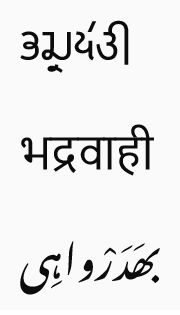Bhadarwahi language
This article needs additional citations for verification. (February 2024) |
| Bhadarwahi | |
|---|---|
| Bhadrawahi | |
| 𑚡𑚛𑚶𑚤𑚦𑚭𑚩𑚯 भद्रवाही بھدرواہی | |
 Bhadarwahi written in Takri, Devanagari and Perso-arabic scripts | |
| Native to | Jammu and Kashmir, Himachal Pradesh |
| Region | Bhadarwah, Doda district |
| Ethnicity | Bhadarwahis |
Native speakers | 120,000 (2011)[1] |
| Dialects |
|
| Devanagari, Takri, Perso-Arabic script | |
| Language codes | |
| ISO 639-3 | bhd |
| Glottolog | bhad1241 |
| ELP | Bhadrawahi |
Bhadarwahi (Bhadrawahi) is an Indo-Aryan language of the Western Pahari group spoken by the Bhadarwahi people of the Bhadarwah region of Indian-administered Jammu and Kashmir.
The name Bhadarwahi can be understood either in a narrow sense as referring to the dialect, locally known as Bhiḍlāi, native to the Bhadarwah valley, or in a broader sense to cover the group of related dialects spoken in the wider region where Bhadarwahi proper is used as a lingua franca. In addition to Bhadarwahi proper, this group also includes Bhalesi, and Khasali (Khashali) dialect.[2] The Churahi language is closely related.
The name of the language is spelt in the Takri as 𑚡𑚛𑚤𑚦𑚭𑚩𑚯. Variants include Bhaderwahi (𑚡𑚛𑚲𑚤𑚦𑚭𑚩𑚯),[3] Baderwali (𑚠𑚛𑚲𑚤𑚦𑚭𑚥𑚯), Bhadri (𑚡𑚛𑚤𑚯), Badrohi (𑚠𑚛𑚶𑚤𑚴𑚩𑚯), Bhadlayi (𑚡𑚛𑚥𑚭𑚣𑚯), and Bhadlai (𑚡𑚛𑚥𑚭𑚃).
Phonology
[edit]| Front | Central | Back | |
|---|---|---|---|
| High | iː | uː | |
| Lower High | i | u | |
| Mid | e eː | oː | |
| Lower Mid | ə | o | |
| Low | ɑː |
| Bilabial | Dental | Alveolar | Postalveolar | Retroflex | Palatal | Velar | Glottal | ||
|---|---|---|---|---|---|---|---|---|---|
| Nasal | m | n | ɳ | ɲ | |||||
| Stop | voiceless | p | t̪ | ʈ | t͡ʃ | k | |||
| aspirated | pʰ | t̪ʰ | ʈʰ | t͡ʃʰ | kʰ | ||||
| voiced | b | d̪ | ɖ | d͡ʒ | ɡ | ||||
| breathy | bʱ | d̪ʱ | ɖʱ | d͡ʒʱ | ɡʱ | ||||
| Fricative | voiceless | s | ʃ | ç çʰ | h | ||||
| voiced | z zʱ | ||||||||
| Approximant | w | l | j | ||||||
| Trill | r | ||||||||
| Flap or Tap | ɽ | ||||||||
According to Masica (1991) there are a set of lateral retroflex affricates /ʈ͡ꞎ ɖ͡𝼅 ɖ͡𝼅ʱ/ from old /Cr/ clusters.[5]
Status
[edit]The language is commonly called Bhaderwahi.[citation needed] Some speakers may call it a dialect of Dogri.[6] The language has no official status. It is classified by the United Nations Education, Scientific and Cultural Organisation (UNESCO) as "definitely endangered," meaning that many Bhadarwahi parents are not teaching it to their children and the number of native speakers is decreasing. Other languages, such as Kashmiri and Urdu/Hindi, are being spoken in the home in its place. This is a natural human tendency to pick up the language of people perceived as better off economically and/or socially.[7]
Notable events
[edit]A daily headline news program is broadcast by a news outlet The Chenab Times in Sarazi and Bhadarwahi languages to promote them.[8][9]
References
[edit]- ^ Bhadarwahi at Ethnologue (22nd ed., 2019)

- ^ Kaul, Pritam Krishen (2006). Pahāṛi and Other Tribal Dialects of Jammu. Vol. 1. Delhi: Eastern Book Linkers. pp. 85–86. ISBN 8178541017.. The classification there includes Rodhari as a separate node, but elsewhere (pp.123–24), it is subsumed under Khasali.
- ^ Phonological System of Bhaderwahi (PDF)
- ^ a b *Dwiwedi, Amitabh Vikram (2015). "Bhadarwahi: A Typological Sketch". Acta Linguistica Asiatica. 5 (1).
- ^ Masica (1991), p. 210.
- ^ Tiwari, Dr Siyaram. Bhartiya Bhashaon Ki Pahchan (in Hindi). Vani Prakashan. ISBN 978-93-5229-677-4.
- ^ "Endangered languages". TheGuardian.com. 15 April 2011.
- ^ "Cultural Academy Doda non-functional since long". Early Times (newspaper). 18 August 2021. Retrieved 19 August 2021.
- ^ "چناب ٹائمز' کا وفد ڈپٹی کمشنر ڈوڈہ سے ملاقی" (in Urdu). Greater Kashmir. 7 August 2021.
Sources
[edit]- Masica, Colin P. (21 March 1991). The Indo-Aryan Languages. Cambridge University Press. ISBN 978-0-521-23420-7.
